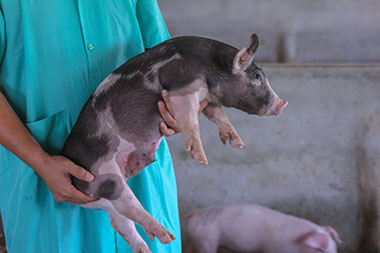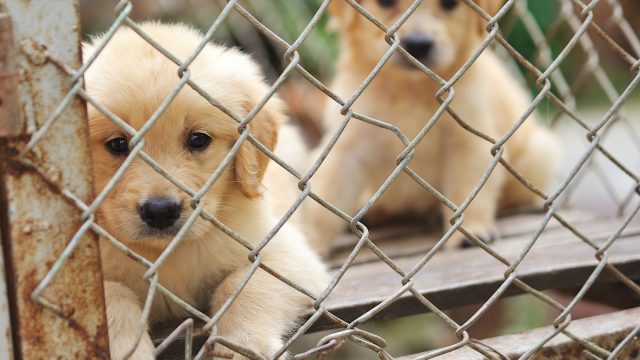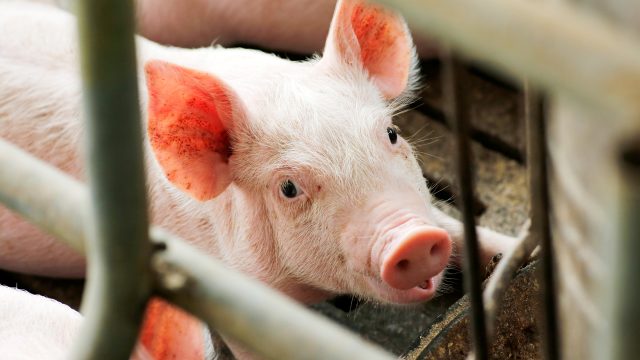
New Kentucky Law Allows Veterinarians to Report Animal Cruelty
By Nicole Pallotta, PhD, Senior Policy Program Manager
Intro/summary
Summary: Kentucky has amended its law prohibiting veterinarians from reporting suspected animal cruelty. Advocates worked for years to change this law, which had good intentions regarding personal privacy but unintended consequences for animal victims of abuse. Although it created differential standards for farmed animals, Kentucky’s law is a significant step forward. Now, all 50 states either allow or explicitly require veterinarians to report suspected animal cruelty, which often co-occurs with other types of family violence. Animals’ legal status as property shapes the veterinarian-client-patient relationship and can create ethical conflicts.
On April 24, 2020, Kentucky Governor Andy Beshear signed Senate Bill 21 into law, which empowers veterinarians to report suspected animal cruelty. Before the passage of this important legislation, Kentucky was the only state that explicitly prohibited veterinarians from alerting authorities that an animal in their care may be the victim of abuse.
In contrast to Kentucky’s previous law — which prohibited veterinarians from releasing “information concerning a client or care of a client’s animal” unless consent was obtained from the animal’s caregiver or a court order was issued — SB 21 allows veterinarians to make good-faith reports if they suspect an animal is being abused.
As is common with legislation, the bill underwent several amendments. For example, the final version created differential standards for reporting cruelty to farmed animals (discussed further below). It also made reporting voluntary rather than mandatory. However, SB 21 is a significant step forward for Kentucky’s animal protection laws.
An Anomalous Law

It may seem counterintuitive that state law would actively prevent veterinarians from reporting suspected animal cruelty — especially since they may be the only people to observe signs of abuse. As the only state in the nation with such a ban, Kentucky was indeed an outlier. Liability and confidentiality issues were the impetus for this unusual law. However, in an effort to address these concerns, Kentucky’s ban went too far and resulted in harm to animals.
From a public policy perspective, veterinarians’ liability and owners’ confidentiality concerns must be balanced with the state’s interest in preventing animal cruelty. Indeed, other states with reporting laws have found ways to keep client confidentiality intact while recognizing that veterinarians are often the only witnesses to animal cruelty. Many individuals and groups worked to change Kentucky’s restrictive law for years, and the Animal Legal Defense Fund assisted with these efforts and supported local advocates.
A spokesperson for the Kentucky Veterinary Medical Association, Jim Weber, told WFPL that the previous reporting ban came about as an accident. The KVMA sponsored legislation to make veterinary records confidential to protect clients’ sensitive information, citing cases of domestic violence where ex-partners tried to find a victim’s address through veterinary records:
Reported domestic abuse cases sparked the group to seek the stronger privacy protections. ‘We sponsored legislation that would make the records confidential,’ Weber said. ‘Unfortunately, it was a case of unintended consequences, where we failed to have an exemption being able to report animal abuse.’
Weber said “his group has tried for almost 10 years to change the statute to allow for reporting of animal abuse” but animal agriculture groups like the Kentucky Farm Bureau actively opposed these efforts. To appease this opposition and move the bill forward, a compromise was reached that created differential standards for farmed animals.
Differential Standards for Farmed Animals
In addition to making reporting voluntary rather than mandatory, the final version of SB 21 also created differential reporting standards for farmed animals. The new law directs veterinarians to report suspected animal cruelty to law enforcement — unless that animal is a farmed animal. Abuse to farmed animals must be reported to the State Veterinarian for a second opinion before a cruelty report can be filed.1
The original version of the bill directed all animal abuse to be reported to law enforcement, but was amended to “only allow the veterinarian to report abuse to the Office of the State Veterinarian for an animal for which an on-farm livestock or poultry care standard has been promulgated or to law enforcement for any other animal.”
 Farmed animals often receive lesser treatment under animal protection laws. Common problems include exemptions in animal cruelty statutes for “customary” or “standard” agricultural practices (alluded to in the above amendment) and underenforcement of laws that do exist. Exempted practices do not have a legal definition and — to the extent they are defined at all — are determined by the industry itself.
Farmed animals often receive lesser treatment under animal protection laws. Common problems include exemptions in animal cruelty statutes for “customary” or “standard” agricultural practices (alluded to in the above amendment) and underenforcement of laws that do exist. Exempted practices do not have a legal definition and — to the extent they are defined at all — are determined by the industry itself.
Farmed animals suffer tremendously on factory farms and receive minimal legal protections. Undercover investigations and whistleblowers have revealed time and again an entrenched and twofold problem: 1) individual acts of egregious abuse committed by workers against farmed animals and 2) the institutional cruelty inherent to the normal business model of factory farms and slaughterhouses. Unfortunately, farmed animals are not cared for with the same standards — including veterinary standards — that companion animals are, and common exemptions make it unlikely that farmed animal maltreatment will be recognized as abuse the way it would if the victim were a dog, cat, or other companion animal.
Lack of knowledge and resources are among the factors that contribute to lax enforcement of cruelty laws when the victim is a farmed animal. To address these issues, the Animal Legal Defense Fund has created farmed animal cruelty prosecution guides to assist prosecutors and law enforcement with the various stages of animal cruelty cases involving farmed animals. We are also working legislatively to repeal common exemptions in animal cruelty laws that exclude “standard agricultural practices” and leave farmed animals vulnerable to abuse.2
Veterinary Reporting Laws
With Kentucky’s new law, which becomes effective in July 2020, all 50 states now permit — either by statute or the absence of prohibitive legislation — veterinarians to report animal cruelty. Approximately two-thirds of states have reporting laws, which either require veterinarians to report suspected animal cruelty or expressly permit them to do so. The remaining states have no laws that address reporting, making them implicitly permissive.
In addition to state laws, administrative regulations may mandate reporting animal cruelty as a duty through state veterinary rules of professional responsibility. If a veterinarian fails to report in such a state, they may face disciplinary action by the state licensing board or even lose their license.
Both mandatory and permissive laws generally provide some protection from civil liability for veterinarians who make good-faith reports. For a comprehensive list of state reporting laws, see the Animal Legal Defense Fund’s resource, “Laws in favor of veterinary reporting of animal cruelty.”3
The Connection Between Animal Cruelty and Interpersonal Violence
Animals are increasingly integrated into human families, which is both good and bad, depending on the family. In a loving family a companion animal may be respected and cared for, but in a violent family, the animal will likely be abused along with other vulnerable family members.
Research has repeatedly shown that violence against people and violence against animals are interconnected.4 While abusing an animal is always wrong, growing awareness of the co-occurrence of animal cruelty with domestic violence and child abuse has helped elevate the issue in public policy and law. Particularly in the fields of criminal justice and mental health, evidence of this connection has brought much-needed attention and resources to the issue as a pressing societal problem.5

In domestic violence contexts, there is often a hierarchy of victims, with children and animals occupying the most vulnerable positions due to their inability to escape the situation. Though possessing more situational agency, adult victims face multiple barriers to safely leave an abusive partner — including the fact that abusers frequently threaten to harm or kill a beloved animal as a way to terrorize, control, and manipulate the human victim into staying. A 2017 study showed that 56 percent of women in domestic violence shelters had delayed their escape out of fear for their animals and a desire to protect them (Barrett et al. 2017). Unfortunately, violent partners often follow through on these threats. Compounding the difficulties that survivors face in fleeing an abusive partner, many domestic violence shelters do not allow companion animals.6
In addition to domestic violence, animal cruelty and child abuse often occur together.7 For this reason, veterinarians play an important role not only in identifying animal cruelty and helping an animal in distress, but also in alerting authorities that there may be child abuse happening in the home. Therefore, Kentucky’s new law will help not only animals, but may help human victims of abuse as well.
Animals’ Legal Status and the Veterinarian-Client-Patient Relationship
Like most issues affecting animals, the veterinarian-patient-client relationship is framed by animals’ legal status. Although the animal is the patient, the human owner is the veterinarian’s client and generally has ultimate decision-making authority because animals are classified as property. Property status affects the veterinarian’s role and responsibilities and can create ethical conflicts.
For example, an owner may bring their healthy companion animal to a veterinarian to be killed for any number of reasons. Veterinarians can refuse to comply with this request on ethical grounds, but there is no law against this; the only legal restriction is that the killing must be done using a method deemed “humane.”8 The case of Emma, a dog killed last year in Virginia because Emma’s deceased owner wanted to be buried with her, brought this issue to light.
Emma was a healthy, friendly Shih Tzu mix who was killed upon her owner’s death because the owner left this directive in her will. Staff at the shelter where Emma spent two weeks following her owner’s death said they could have easily found her a new home. Yet, the executors of the will were determined to carry out the deceased woman’s instructions. The shelter complied and released Emma to the executors, who had her killed by a veterinarian.
This incident, which received widespread media coverage, understandably shocked many. However — highlighting one of the problems with animals’ current legal status — it is generally not against the law to destroy one’s personal property, provided it is done via legally authorized methods.9 When animals are property of their owners, incidents like this routinely happen, although they do not typically make the news.10
In Emma’s case, some veterinarians told the media they would not have carried out the pet destruction clause. Yet, the executors obviously found a veterinarian willing to fulfill the owner’s wish. However, for many veterinarians being asked to kill a healthy adoptable animal creates a difficult conflict, which arises directly from animals’ legal status as property.
Conclusion
For more than a decade, Kentucky ranked last in the Animal Legal Defense Fund’s annual rankings of state animal protection laws. In 2019, the state broke its losing streak and rose to 47th place after criminalizing the sexual assault of animals.11 This new law continues that upward trajectory. While there is still much room for improvement to ensure animals are adequately protected in Kentucky, allowing veterinarians to report suspected cruelty is an important step forward.
Further Reading
- James, Josh. “KY Bill Lets Veterinarians Report Abuse, But They’ll Need A Second Opinion On Farmed Animals.” WUKY. March 3, 2020.
- Animal Legal Defense Fund, Veterinarians’ Role in Reporting Animal Cruelty.
- Animal Legal Defense Fund, State Animal Protection Laws Ranked: Illinois is #1, Mississippi #50
- DeGue, Sarah A. and David DiLillo. 2008. “Is Animal Cruelty a ‘Red Flag’ for Family Violence? Investigating Co-Occurring Violence Toward Children, Partners, and Pets.” Journal of Interpersonal Violence. 24(6):1036-56
References
- In some states, the State Veterinarian’s Office or the Department of Agriculture is tasked with investigating cruelty to farmed animals. Unfortunately, these agencies tend to be deferential to the farmer, and hardly ever seize animals, issue citations, or send cruelty cases to prosecutors for charging.
- For more about this issue, see our free recorded webinar, “From Farmhouse to Courthouse: Applying Animal Cruelty Law on Behalf of Farmed Animals 2019.”
- See also the Animal Legal & Historical Center’s “Table of Veterinary Reporting Requirement and Immunity Laws.”
- It is worth noting that in this context — research on the connection between animal abuse and interpersonal violence — “violence against animals” and “animal cruelty” generally refer to the animals we define as companions, i.e. “pets.” Farmed animals are treated very differently in society and the legal system, and the institutional violence committed against them as the routine way of doing business in our food system is not typically included in studies of domestic violence. One notable exception looked at crime rates in communities surrounding slaughterhouses. See: Fitzgerald, Amy J., Linda Kalof, and Thomas Dietz. 2003. “Slaughterhouses and Increased Crime Rates: An Empirical Analysis of the Spillover From ‘The Jungle’ Into the Surrounding Community.” Organization & Environment. Vol. 22 (2). 158-184.
- For more information, see the Animal Legal Defense Fund’s resource: “The Link Between Cruelty to Animals and Violence Toward Humans.”
- For more on the negative impact of “no pets” policies, see: Pallotta, Nicole. 2019. “Chattel or Child: The Liminal Status of Companion Animals in Society and Law.” Social Sciences. Vol 8(5): 158.
- Nelson, Sharon L. 2011. “The Connection between Animal Abuse and Family Violence: A Selected Annotated Bibliography.” Animal Law. 17: 369.
- While there is no law against “destroying” your personal property — even if that a property is a living animal —there are legal restrictions on whether animals and humans can be buried together in traditional cemeteries in some states.
- Exceptions include some categories of artwork under the federal Visual Artists Rights Act. With regard to companion animals, courts can and — per public policy — should refuse to uphold pet destruction provisions. However, outside of the probate law context, it is common for owners to “euthanize” otherwise healthy animals for a variety of reasons, as do many shelter facilities.
- It is important to note that while not against the law, nor are these provisions legally binding. A handful of trial courts have invalidated will provisions instructing companion animals to be killed upon the death of their owner, typically on the grounds that killing healthy animals violates public policy. However, these wills only end up in court when they are disputed. In Emma’s case, neither the shelter facility nor the executors of the will challenged the owner’s wishes. For an illustrative case that was successfully challenged, see “1980 Flashback: The legal battle for a dog’s life.”
- This leaves four states without bestiality laws: Hawaii, New Mexico, West Virginia, and Wyoming.
Donate to Honor Someone Special
Donating to the Animal Legal Defense Fund is a wonderful, thoughtful way to honor the special people (or animals!) in your life. Not only will your Honor gift convey your love — it’ll also help save the lives of animals in need.
Related
-
Court Rules Craigslist Puppy Sellers Illegally Neglected Animals, Defrauded Families
Following a week-long trial in 2022, a Los Angeles Superior Court Judge issued a decision finding that Craigslist puppy traffickers committed animal neglect and fraud by selling fatally sick dogs to families.November 10, 2023 Press Release -
Lawsuit Filed Against Pig Breeder Holden Farms Related to Feeding Dead Piglets’ Intestines and Feces to Mother Pigs and Other Offenses
Animal Legal Defense Fund filed a false claims lawsuit against Holden Farms. Allegations include violating federal and state laws banning “garbage feeding” and state animal cruelty law.August 10, 2023 Press Release -
Washington Supreme Court Urged to Consider the True Value of Humans’ Relationship with Companion Animals
Animal Legal Defense Fund’s amicus brief urges the court to review a case regarding the negligent death of a dog and the resulting emotional damagesJune 5, 2023 Press Release




